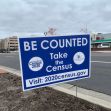President Donald Trump announced Thursday that he has directed the U.S. Department of Commerce to begin work on a new national census that would exclude undocumented immigrants from the population count, a move that would mark a major break from long-standing census practices and set the stage for significant legal battles.
In a post on Truth Social, Trump said the proposed survey would be “highly accurate” and based on “modern day facts and figures,” incorporating “results and information gained from the Presidential Election of 2024.” He added that “people who are in our country illegally WILL NOT BE COUNTED IN THE CENSUS.” The announcement did not clarify whether the plan would alter the 2030 census or involve an additional count before then.
For more than two centuries, the U.S. census has counted all residents regardless of citizenship or immigration status. The Constitution requires a national count every 10 years to determine congressional representation, and the 14th Amendment mandates an enumeration of “the whole number of persons in each State.” That total population figure is used to apportion seats in the U.S. House of Representatives and allocate federal funding.
Any change to the census could significantly shift the balance of power in Congress. Population trends suggest that up to a dozen seats could move from Democratic-leaning or politically competitive states to Republican strongholds in the next decade. Republican leaders, including Florida Gov. Ron DeSantis and Rep. Marjorie Taylor Greene of Georgia, have recently voiced support for a census limited to U.S. citizens.
Undocumented immigrants are disproportionately concentrated in states and districts that lean Democratic, such as California, New York, Illinois, and New Jersey. Counting all residents, as has historically been the practice, boosts these states’ representation in Congress and increases their share of federal funding. Removing undocumented immigrants from the count would likely reduce the number of congressional seats and Electoral College votes allocated to those states, shifting political power toward states with smaller immigrant populations, many of which reliably vote Republican.
If undocumented immigrants had been excluded from the 2020 census apportionment, estimates from independent demographic analyses suggest that California could have lost one or more House seats beyond the one it already lost, while Republican-leaning states such as Texas, Florida, and Montana could have gained additional representation. This shift would not only alter the makeup of Congress but also impact state-level redistricting, potentially creating more Republican-favored districts and strengthening the party’s electoral position in the 2026 midterms and beyond.
Trump’s call for a census excluding undocumented immigrants aligns with efforts by Republican-led states to reshape political maps in ways that favor their party. In recent years, GOP-controlled legislatures in states such as Texas, Florida, and North Carolina have pushed through redistricting plans that courts and voting rights groups say dilute the voting power of Democratic-leaning communities, particularly communities of color.
By altering the underlying population counts used for redistricting, an exclusionary census could compound the effects of partisan gerrymandering. Removing undocumented immigrants from the data would shrink representation for diverse urban areas while preserving or increasing representation for predominantly rural and suburban areas that trend Republican. This strategy aligns with recent court-tested redistricting maneuvers, such as “cracking” and “packing” districts designed to secure long-term partisan advantages, even in states where overall voter registration numbers are more evenly split.
Combining population-based exclusions with aggressive map drawing could produce a political landscape where electoral outcomes are increasingly insulated from demographic changes and could skew the results of representation for decades.
Trump’s announcement revives efforts from his first term to reshape the census. In 2019, his administration attempted to add a citizenship question to the 2020 count, a proposal the Supreme Court blocked. Critics argued the question would lead to an undercount in immigrant communities, affecting congressional representation and the distribution of billions in federal aid. Trump later ordered agencies to collect citizenship data through administrative records instead.
Legal challenges to any new census excluding undocumented immigrants are likely to cite the Constitution’s plain language and prior Supreme Court rulings. In 2020, the Court dismissed a case challenging Trump’s attempt to exclude undocumented immigrants from apportionment, but did not resolve the constitutional question, leaving the door open for future litigation.






